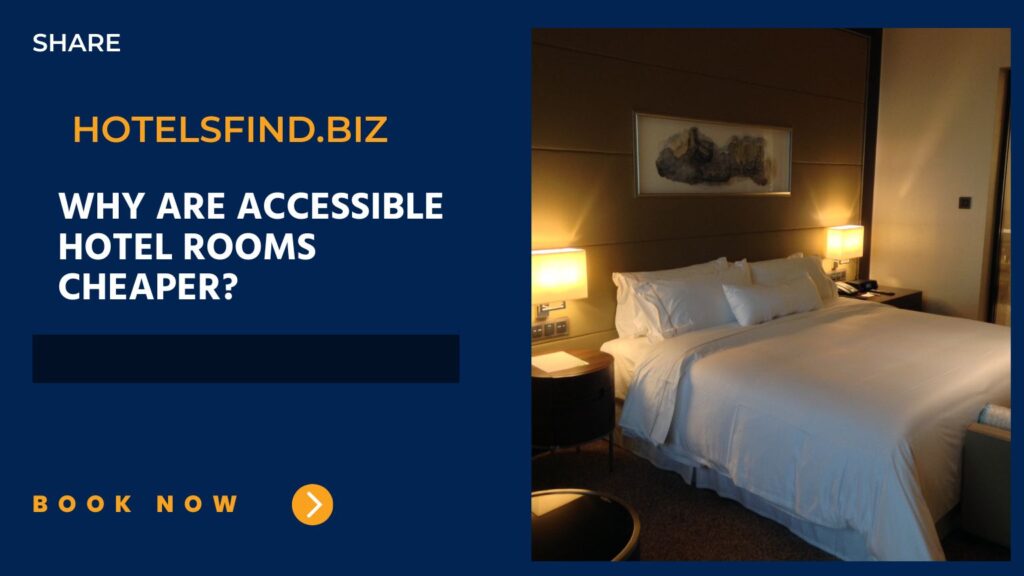Why Are Accessible Hotel Rooms Cheaper? 2024
The concept of accessible hotel rooms being more budget-friendly may seem counterintuitive at first glance.
Why Are Accessible Hotel Rooms Cheaper? However, a closer examination reveals a variety of factors that contribute to the affordability of these accommodations.
In this discussion, we explore why accessible hotel rooms are often priced more competitively, shedding light on the considerations that make them an economical choice for travelers.

Why Are Accessible Hotel Rooms Cheaper?
Accessible hotel rooms are often more budget-friendly due to various factors. The lower demand for these rooms, coupled with the hospitality industry’s commitment to inclusivity, results in competitive pricing.
Additionally, accessibility features may lead to misconceptions about luxury, impacting the perceived value.
As a result, travelers can find cost-effective options while still enjoying the necessary accommodations, making accessible hotel rooms an economical choice for all.
What are accessible hotel rooms?
Accessible hotel rooms are hotel rooms that are designed to accommodate travelers with disabilities, such as people who use wheelchairs or have other mobility impairments.
These rooms are equipped with special features such as wider doorways, lower light switches, grab bars, roll-in showers,
and other amenities that make it easier for people with disabilities to navigate and enjoy their stay.
The demand for accessible hotel rooms
According to the World Health Organization, more than 15% of the world’s population has some form of disability.
As a result, there is a growing demand for accessible hotel rooms, especially as more people with disabilities are traveling for business and leisure.
This demand is expected to continue to grow as the population ages and more people require accessible accommodations.
The cost of building accessible hotel rooms
One reason why accessible hotel rooms are cheaper is that they are more cost-effective to build.
While the initial cost of installing accessible features may be higher, these features often require less maintenance and upkeep than standard hotel rooms.
Additionally, accessible hotel rooms are often built with a universal design in mind, which means they are designed to be accessible to everyone, regardless of their ability.
The market for accessible hotel rooms
The market for accessible hotel rooms is still relatively small compared to the overall hotel industry,
which means that hotels may offer cheaper rates for these rooms to attract more customers. However, as the demand for accessible hotel rooms grows, prices may also increase.
Government incentives for accessible hotel rooms
Governments around the world may offer incentives to hotels that provide accessible accommodations.
For example, in the United States, hotels that meet certain accessibility standards may be eligible for tax credits or other benefits.
These incentives may help offset the cost of building and maintaining accessible hotel rooms, which could result in lower prices for customers.
The impact of accessible hotel rooms on the hospitality industry
Accessible hotel rooms not only provide accommodations for people with disabilities, but they also have a positive impact on the hospitality industry as a whole.
By providing accessible accommodations, hotels can attract a wider range of customers, which can lead to increased revenue and customer loyalty.
Additionally, accessible hotel rooms may help hotels differentiate themselves from their competitors.
Are accessible hotel rooms worth it?
Accessible hotel rooms can be a great option for travelers with disabilities, as they provide the necessary accommodations for a comfortable and enjoyable stay at a lower cost.
However, it’s important to note that not all accessible hotel rooms are created equal, and some may not meet the specific needs of every traveler.
It’s important to do your research and choose a hotel that meets your individual needs and preferences.
The Future of accessible hotel rooms
As the demand for accessible accommodations continues to grow, it’s likely that hotels will continue to invest in and improve their accessible offerings.
Additionally, advancements in technology may make it easier for hotels to provide more advanced and sophisticated accessible features, such as voice-activated controls or smart home technology.
What to consider when booking an accessible hotel room?
When booking an accessible hotel room, there are a few key factors to consider. First, make sure the room meets your specific needs, such as wider doorways or a roll-in shower.
Additionally, consider the location of the room, as well as the accessibility of the hotel’s amenities and services, such as the front desk or restaurant.
Tips for a comfortable stay in an accessible hotel room
To ensure a comfortable stay in an accessible hotel room, there are a few tips to keep in mind. First, communicate your specific needs and preferences with the hotel staff,
who may be able to provide additional accommodations or services. Additionally, make use of the accessible features in the room, such as grab bars or lowered light switches.
Alternatives to Hotels for 18-Year-Olds
There are several alternatives to hotels for 18-year-olds who are looking for accommodations:
- Hostels: Hostels are a popular option for budget travelers, including young adults. They offer shared dormitory-style rooms, as well as private rooms, and are often equipped with communal areas, such as kitchens and lounges, where guests can socialize with each other.
- Couchsurfing: Couchsurfing is a hospitality service that connects travelers with locals who are willing to host them for free. This option is ideal for adventurous young adults who want to meet new people and experience local culture.
- Airbnb: Airbnb is an online marketplace that allows individuals to rent out their homes or apartments to travelers. This option provides more privacy than a hostel and is often cheaper than a hotel.
- House-sitting: House-sitting involves taking care of someone else’s home while they are away. This option can provide free accommodations, as well as the opportunity to live like a local in a new city.
- Camping: Camping is a fun and affordable way to travel, and is ideal for young adults who enjoy the outdoors. There are many campsites and national parks that offer camping facilities.
- Volunteering: Volunteering abroad can be a rewarding way to travel, and often includes accommodations and meals. There are many organizations that offer volunteer opportunities for young adults.
Overall, there are many alternatives to hotels for 18-year-olds, and each option offers a unique experience.
Young adults should consider their budget, interests, and travel goals when choosing their accommodations.
People also ask
What is the difference between accessible and standard rooms?
Accessible rooms are designed to meet the specific needs of travelers with disabilities, such as wider doorways, grab bars, or roll-in showers.
Standard rooms, on the other hand, do not have these features and are designed for travelers without disabilities.
What does it mean when a hotel room is accessible?
When a hotel room is accessible, it means that it has been designed and equipped to meet the needs of travelers with disabilities.
This includes features such as wider doorways, grab bars, and roll-in showers.
Are accessible hotel rooms bigger?
Accessible hotel rooms may be bigger than standard rooms in some cases, but this is not always the case.
The size of the room can vary depending on the specific hotel and location.
What are the features of an accessible hotel room?
Accessible hotel rooms typically have features designed to meet the needs of travelers with disabilities,
such as wider doorways, grab bars, roll-in showers, lowered light switches, and visual alarms for the deaf or hard of hearing. The specific features may vary depending on the hotel and location.
Conclusion
In conclusion, accessible hotel rooms are often cheaper than standard rooms due to the lower cost of building and maintaining them, as well as the smaller market for accessible accommodations.
However, the demand for accessible accommodations is growing, and it’s important for hotels to continue investing in and improving their accessible offerings.
For travelers with disabilities, accessible hotel rooms can provide a comfortable and enjoyable stay at a lower cost.







